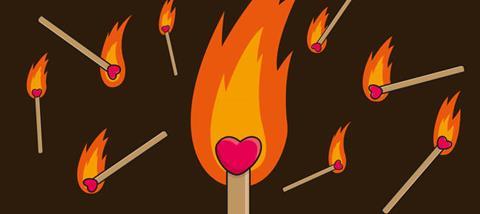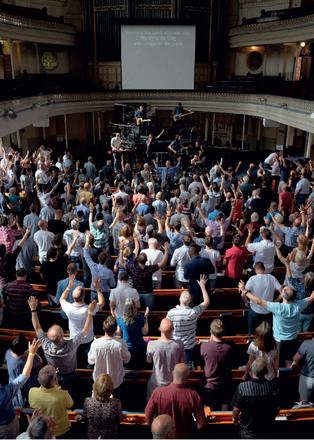Talk of revival isn’t nearly as common as it used to be. Terry Virgo explains why now may be the time to pray again

Revival is a theme which used to stir believers more than it does today. When I was first converted in the 60s it was the subject of prayer meetings and inspiring books recounting amazing stories of what God had done in previous generations. Excitement continued to build and by the 1990s our worship songs were full of revival-centred lyrics such as ‘We need another Pentecost’, ‘A time of jubilee is coming when young and old return to Jesus’ and ‘Send revival, start with me’.
Since then, talk of revival across the evangelical Church has subsided. But I believe now is the time for us to take revival seriously once more. I’ve been stirred to pray again and I’m not the only one. Earlier this year, Newfrontiers leaders gathered at Westminster Chapel to pray with fervour and passion that God would again send revival.
In the classical sense revival is not, as some of our American brothers would regard it, a series of evangelistic meetings, but rather a phenomenal sovereign intervention from God which starts in the Church, often leading to profound repentance and fresh encounters with God. This overflows into the world, resulting in large numbers of conversions and ultimately leading to a climate of social change. Jonathan Edwards regarded revival as “God’s major means of extending his kingdom”. This is certainly something we desperately need in our modern society!
The 1859 revival
In commemorating the centenary of the extraordinary revival of 1859 which swept the UK, Dr Martyn Lloyd-Jones interrupted his planned programme to instead spend the whole year preaching on revival. Even before the ‘swinging 60s’, when British moral culture began to crumble, the doctor expressed his opinion that if the UK did not experience revival soon it would slip into alarming decadence.
The so-called 1859 revival had its origins in New York when on 23rd September 1857 Jeremiah Lamphier, a city missionary, began a lunchtime prayer meeting. After half an hour only half a dozen came, but the following week 20 turned up and then 40. Within a few months, following a financial crisis in New York, 10,000 people were gathering for lunchtime prayer meetings, with many churches opening their doors for prayer. Eventually the dam broke and floods of power led to more than a million people being added to American churches over the following three years.
Revival then broke out in Ulster, and ultimately right across the UK, resulting in a million being added to the British church. Dr J Edwin Orr, in his classic The Second Evangelical Awakening in Britain (Marshall, Morgan & Scott), has catalogued how town prayer meetings began to multiply, sometimes gathering hundreds of believers, and then God broke though. Theatres and circus tents were employed to gather the vast crowds pressing in to hear the gospel. Often painful conviction gripped those seeking salvation and long queues of people converged on places where the gospel was being preached.
Similar things took place in the Welsh revival of 1905 and, most recently, in the Hebrides revival of 1949 where a minister began to spend Tuesday and Thursday nights in a barn with a few praying members. One night it was reported, “A power was let loose that shook the Hebrides”. On the final night of Duncan Campbell’s two-week mission he pronounced the benediction, but was amazed to discover a great crowd gathered at the door, pressing into the church and crying to God for mercy. Whole families were transformed and it was later testified that the entire island was aware of God and “it seemed as if the very air was electrified with the Spirit of God”.
Revival is not strictly a biblical word, but Old Testament history demonstrates not steady progress among God’s people, but times of spiritual decline often leading to people crying to God, followed by seasons of God’s merciful intervention and fresh spiritual awakening. Church history has followed a similar pattern. The great revival associated with Wesley and Whitefield in the 18th Century, where Whitefield sometimes preached to 30,000 in the open air, was in serious decline by 1859 when God once again intervened.
The charismatic renewal
For myself, in the early 1960s, a growing longing for revival led to me leaving my job and joining with two friends who prayed daily that revival would come.
We often had remarkable times in God’s presence. About that time the so-called ‘charismatic movement’ began to break out. A fresh breeze blew through the Church, which led me on a journey that I did not anticipate. Dr LloydJones had described revival as when many Christians are filled with the Holy Spirit, but, though many have undoubtedly been filled, the charismatic renewal has certainly not been classic revival.
God has not sent revival to our nation for many years. Instead, I believe the new wine that we were experiencing during the charismatic renewal required new wineskins. Our rather formal church life could not cope with the fresh presence of God that we were enjoying. So new churches were started, often in homes, where flexibility and fresh obedience to the patterns of New Testament church life could be pursued. These churches grew and multiplied, moving from homes to hired halls and, for many, ultimately into large warehouses where hundreds now gather. Bible weeks and summer camps proliferated and new expressions of worship emerged. Church planting teams were raised up and hundreds of new churches have been planted across the nation and overseas.
For me the word ‘revival’ was replaced by the word ‘restoration’, a longing for biblical principles to thoroughly shape our church life. We have seen much happening but the reality faces us, we still desperately need the kind of classic revival that will confront our secular nation with the glorious gospel of the crucified, risen and enthroned Christ. Could the Church be in a much stronger position to receive revival than in years past? I think so.
Praise God for those currently being saved and added to local churches, but the nation has long since lost its Christian orientation. Only revival can stem the tide and see things turned around.
The nation has lost its Christian orientation. Only revival can stem the tide
The government cannot legislate for righteousness. It will only reflect the national morality. Only a spiritual awakening of real magnitude can arrest the drift and provide the upcoming generation with the true challenge of the gospel.
Not that revival will universally be acclaimed and welcomed. In Whitefield and Wesley’s day, opposition from outside and within the Church was formidable. Nevertheless vast numbers were saved and it has been argued that the UK was saved from some of the horrors of the French Revolution, which was taking place at the same time, because social transformation began to take place on the back of spiritual awakening.
Elijah, the troubler of Israel
Solomon’s kingdom represented one of the high points in Israel’s history. It is staggering that within 58 years, when Ahab had become king, it was illegal to worship Israel’s true God. Israel had entirely lost its way. One bad king had succeeded another in the downward spiral. Through Jezebel’s influence Baal was now to be worshipped.
Elijah was raised up by God to plead for nation-humbling drought and then for merciful rain. May God teach us to pray with wisdom and strength. So much has changed in a similar period of time in our own nation. In some ways it has become unrecognisable, when political figures can be hounded out of office because of their Christian commitment and gospel values are thoroughly marginalised.
By definition, revival starts within the Church, when we recognise more clearly our true identity and calling, turn away from the contemporary idols that compromise our lives and give ourselves unreservedly to God. Elijah’s call not to “hesitate between two opinions” (1 Kings 18:21) has to come to the Church first before it can be brought to our secular nation. Evan Roberts’ famous prayer in the Welsh revival of 1905 asked God first to “bend the Church” then break out on the nation. His prayer was answered. Churches were transformed, hundreds of thousands were saved and society was profoundly transformed. This is authentic revival.
Prophetic signs
Are there any grounds for encouragement today? Certainly we can come before God with the same biblical promises that our forefathers have argued, pleading that he would “rend the heavens and come down” (Isaiah 64:1) and that he would “pour water on him who is thirsty, And floods on the dry ground” (44:3, NKJV).
But there’s more. Some might remember a prophetic vision which Jean Darnell, an American evangelist, shared very publicly in the 1970s that she had seen the UK in darkness, but with beacons shining in towns scattered across the nation. More recently a friend who has been blessed with a remarkable gift of prophecy was shown by God a scene of mourning across the nation, with towns filled with flowers and expressing corporate grief. She had this vision just weeks before Princess Diana’s tragic accident.
This same lady in 1972 also saw a vision of the nation in darkness with scattered beacons of light which grew and ultimately came together in a great breakthrough of light. She felt that God said that he would confirm this to her by two natural signs.
The first came when in 1977, on the Queen’s Silver Jubilee, she saw on television beacons being lit across the nation and then in 1995 again beacons celebrating the 50th anniversary of VE day. Later, after she’d been asking the Lord for further encouragement, a man arrived at her church, asking to speak to her. He had been directed by God to the church, not knowing which one she attended, and was told to ask for her. He didn’t know why, but he knew that he had to tell her that his job was in connection with the millennium beacon committee responsible for the lighting of beacons that would celebrate the new millennium. He was to tell her that what God had shown her at the beginning of her walk with him was going to happen.
For myself, I’ve received many encouragements over the years, the latest sent to me by an Indian prophet who wrote at the beginning of the year before the terror attacks in Manchester and London, saying that I would see revival following a wave of fear in the nation.
Pray for revival again
It occurs to me that had revival broken out in the early 60s, the Church was broadly rather cold and formal, hardly qualified to embrace numbers of new converts from a broken world. Now hundreds of new churches have either come into being or have come alive with fresh life in the Spirit. Lights have been lit across the nation. Also a far greater degree of unity and friendship has come, largely replacing hostility, distrust and suspicion which formerly seemed to characterise inter-church relationships.
So what can we do? For some time I have found myself praying that God would multiply prayer. I was thrilled at Archbishop Welby’s call to the ‘Thy Kingdom Come’ prayer days and the encouraging response. Also rereading J Edwin Orr’s The Second Great Awakening I’ve noticed how many evangelists were raised up, some famous, such as DL Moody, some unknown but extraordinarily fruitful. In revival the gospel must be preached! Evangelism is an inevitable overflow in revival because revival makes eternal issues a reality.
The Lord of the harvest must thrust forth labourers, so I am praying for men and women like a young man I spoke to recently who told me that aged 14 at a Bible week the Holy Spirit came upon him and God called him and told him that he was to become an evangelist. May God call and send many, but with a new extraordinary awareness that God has heard our cry, seen our plight and come down to deliver by his own phenomenal presence.
I’m not in the date-predicting business but I do live with promises that I feel God has given me. I want to emulate Abraham who grew strong in faith, fully persuaded that what God had promised he is also able to perform. Let us join together in praying, Lord please send revival!





























